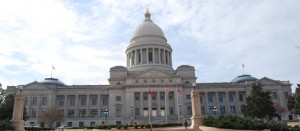By Steve Brawner
© 2015 by Steve Brawner Communications, Inc.
If I were to tell you that a state legislature this year passed a six-cent gas tax increase. abolished the death penalty, and voted to let young illegal immigrants brought by their parents to America obtain a driver’s license, what state would you guess that would be? California? Massachusetts? Maybe Colorado?
Try Nebraska.
Yep. The Midwestern state where three-fourths of the legislators are Republicans did all of those things. In fact, legislators overrode their newly elected Republican governor’s veto on all three bills.
This column has an Arkansas connection, but first, what’s up with Nebraska?
The sponsor of the gas tax increase, Sen. Jim Smith, told me the bill was simply an acceptance of financial reality. The roads needed more money, and legislators didn’t trust Congress to help. Two of Nebraska’s neighbors, Iowa and South Dakota, also raised their gas taxes this year.
Regarding the death penalty ban, which he voted against, he said some Nebraska legislators are Catholic, and the Church opposes the death penalty. Also, a number of Nebraska legislators are libertarian Republicans, which means they tend to distrust government in all walks of life, including social issues. As another Nebraska lawmaker explained, if she doesn’t trust government to manage her health care, she shouldn’t trust it to put someone to death.
As for young illegal immigrants with driver’s licenses, Nebraska was the only state that had such a ban. The thinking in ending it was, the residents have a legal status under President Obama’s executive order, and they need to be able to drive in order to get to work.
There are two other things worth noting about Nebraska. While its lawmakers are Republicans and Democrats, it’s the only state where they don’t run with a party label attached. Consequently, Smith said, “We have 49 independent contractors.”
Also, Nebraska is the only state with a unicameral legislature – in other words, just a Senate with no House. While Arkansas has 135 legislators, Nebraska has 49. While Arkansas lawmakers considered 2,200 bills and passed 1,288 into law this year, Nebraska legislators only considered about 600 bills and passed about 240 into law. Could a more focused agenda help legislators engage in serious debates about big issues? Just a thought.
Here’s another reason why I’m writing about Nebraska. Republicans everywhere tend to be ideologically unified. Officeholders tend not to wander too far from party orthodoxy, even when they want to, lest they be labeled a “RINO” (Republican In Name Only) and draw a primary opponent. Republican commentators, meanwhile, are so predictable that there’s usually little point in seeing what they have to say. Democrats, long the more disorganized party, are becoming more unified, too, but this column is not about them.
And yet in Nebraska, a legislature full of Republicans passed bills that raised the gas tax, ended the death penalty, and made life easier for illegal immigrants. Those are not the standard conservative positions, but it’s not hard to see the gas tax as pro-commerce, the death penalty ban as anti-government, and the driver’s license bill as pro-personal responsibility – all principles conservatives say they support.
So if that can happen in one conservative, Republican, mid-America state with an agricultural heritage and only one football team, could it happen in another? As the Republican majority becomes more entrenched in Arkansas, like it’s already entrenched in Nebraska, could we see the emergence of a more creative, chaotic conservatism that applies the party’s principles in new ways?
Certainly, divisions among Arkansas Republicans have already occurred over issues like the Medicaid private option. Some see it as a way to reform government health care, while others see it as capitulation to Obamacare. Arkansas Republicans also will divide along urban and rural lines just like Arkansas Democrats always did, and just like Republicans do in Nebraska.
What other types of factions will form? How often will one faction team up with Democrats? And just how chaotic will it often be? It certainly was chaotic when Democrats had a secure majority.
Maybe this was an unusual year in Nebraska. Maybe it was simply that the time had come for those three bills. Or maybe voters there will send some of those legislators packing during the next election.
Or maybe it’s still possible to buck the party orthodoxy, in either party in any state, if legislators see themselves as independent contractors.
